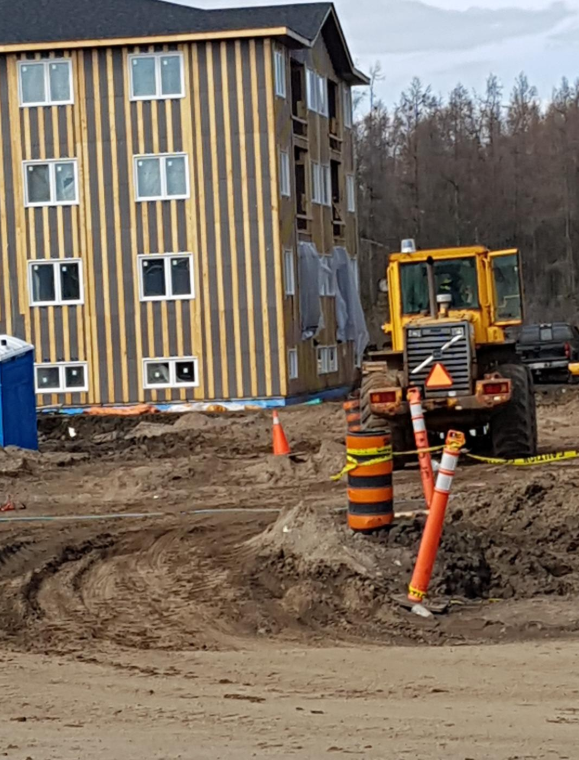THUNDER BAY — Some Thunder Bay residents are asking why work continues on a number of local building projects despite new rules that went into effect across the province on the weekend.
The answer is that the restrictions aimed at mitigating the spread of COVID-19 do not apply to all construction projects.
Projects permitted to continue include residential builds where:
- a footing permit has been granted for single family, semi-detached and townhomes
- an above-grade structural permit has been granted for condominiums, mixed use and other buildings
- the project involves renovations to residential properties and construction work was started before April 4, 2020
Some other types of work are also allowed, including those associated with the healthcare sector, and those connected to critical provincial infrastucture including the transit, transportation, energy and justice sectors.
The Ministry of Labour has published a memo advising that under Ontario law, employers are required to keep workers and work sites safe and free of hazards.
Workers have the right to refuse unsafe work.
The ministry says all parties must place an increased focus on health and safety in order to keep job sites open during the current pandemic.
"All measures taken to prevent the spread of COVID-19 should be done in compliance with requirements under the Occupational Health and Safety Act and associated regulations and public health directives issued by the Chief Medical Officer of Health," the memo states.
The ministry is advising employers they need to post and communicate COVID-19 policies to employees and contractors, including:
- the sanitization of workplaces
- how to report illness
- how to ensure physical distancing
- how work will be scheduled
As advised by the Chief Medical Officer of Health, employers should consider:
- staggered start times
- staggered breaks and lunches
- restricting the number of people on-site and where they are assigned to work
- controlling site movement by limiting the potential for workers to gather
- limiting the number of people using elevators and hoists
- holding meetings in an outside or large space
Workers with COVID-19 symptoms, the ministry says, should be sent home with advice to complete the province's online self-assessment form, or to call Telehealth or their doctor.
If an employer learns that a worker has tested positive for COVID-19 due to exposure at the workplace, or that a claim has been filed with the Workplace Safety and Insurance Board, the employer is required to notify the ministry within four days.
Workers' advocate concerned about compensation for COVID-19
The Thunder Bay & District Injured Workers Support Group isn't convinced a claim to the WSIB for compensation for COVID-19 related illness will have a satisfactory result.
"As a long term advocate for injured and disabled workers in Ontario, I have seen how hard it is to ge the WSIB to approve a claim for disease," spokesperson Steve Mantis says.
"With our present system, the worker must prove their illness is a direct result of a workplace exposure. Now, who can prove they got the virus at work rather than while on the bus or while shopping for groceries?," Mantis asked in an interview with Tbnewswatch.
He said workers need to do their homework to know if they'll be protected if they fall ill, "know what's there in case you do get sick, and how to access those benefits."
In the construction industry specifically, he noted, workers often rely on each other to stay safe.
"You're handling heavy equipment, heavy materials, working close together, and sometimes the precaution of keeping six feet apart can come into conflict with actually making sure you are safe and working together," Mantis said.
He suggested employers take extra steps such as providing wash basins with hot water and soap available throughout the workplace, "so that you can continually keep yourself clean in case you do get exposed to that virus."
Mantis noted "It's an extra expense, something that doesn't usually happen on a construction site. But it's one of the things that can be done in advance to help prevent illness."
